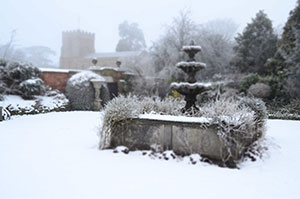There are approximately 2,300 garden centres in the UK, with industry sales worth approximately £5billion a year says the Garden Centre Association (GCA). With garden retailing changing and evolving, businesses have found themselves diversifying into new categories to become destination shopping experiences, with a particular focus on creating a “one stop shop” experience that is profitable… Read more
Preparing your Garden for Spring, in Winter
By Will Haxby, Marketing and Ornamental Sales Director at Haddonstone
In the colder months, it’s easy to neglect, forget or put off looking after your garden. And it’s understandable, especially with the drop in temperature and sunlight that the winter months bring.
But, for many homeowners, the garden is your pride and joy. In fact, the average Brit spends more than 2000 days gardening in their life, and it can add as much as 20% to the value of a home. Your garden could be the reason you purchased a house in the first place, and where you plan to host friends and family for next year’s sports spectacular when the Olympics, Euro Championships and Wimbledon all come back around.
You don’t want to be caught up in a frenzy of seed sowing, renovation and frantic pruning of dead leaves and broken branches in Spring. Here’s what we recommend you do now, to have less work to do later:
Clean, Clean, Clean
Remove fallen branches, debris and sticks from beds, paths and lawns while it’s quieter and calmer, and there’s less plants (and people around) to contend with. Having a tidy up in the winter months can help to make your job less hectic in Spring. Wash the outside of your greenhouse to reduce grime and any bacteria that’s grown, and disinfect all areas to avoid the chances of any pests staying there all winter.
Seasonal pruning
Winter is the traditional time to prune, and for good reason. By pruning and trimming away dead or damaged branches from trees, cutting back plants to prevent them from outgrowing their space, and removing overgrown branches or stems, you can reduce the chances of infestation and bacteria, giving your plants the refresher they often need to look better in spring.
By refreshing them in December, they will recover faster in spring, with new growth ready for you to show off your pride and joy. As for larger pruning jobs  or tree removal; it’s much more efficient to do it in winter months because dying trees can be dangerous in winter, especially if there is ice or snow. By pruning them, it refreshes and renovates weaker looking trees and also makes them safer.
or tree removal; it’s much more efficient to do it in winter months because dying trees can be dangerous in winter, especially if there is ice or snow. By pruning them, it refreshes and renovates weaker looking trees and also makes them safer.
Take advantage of the rain
Make the most of seasonal rainfall and collect it! Winter has the most prominent rainfall of all the seasons, so take advantage of this. Consider installing a water butt in your garden which can harvest the rainwater. In the push for more sustainable gardening, using rainwater reduces the demand for water supplies, which is even more important for avoiding droughts later down the line in spring and summer. The natural acidity of rainwater is also good for soils that have become alkaline due to over-liming acidic soils.
Companion plant
Companion planting can help each crop to grow better, and also deter any insects or common winter pests from the crops before you have to manually move them. There are an abundance of plants that you can grow together to achieve the best chances of gardening success.
Plants such as dill are great to grow next to broccoli, as are carrots and leeks. By growing the latter two together, the strong odours support each other to drive away the other’s pests. Garlic lovers can take advantage of an array of companion plants to improve its overall growth, such as spinach and potatoes. Ensure that all companions are planted at the same time as any edible crops, as this will avoid insects taking over vegetable beds and allotments.
Garden renovation
Naturally, most of us think about what we want to do to change our gardens when the sun is shining in June, but if you plan ahead and do any landscaping and renovation work in winter, you’ll have longer to prepare, design and do the work for summer.
Those of you who want to enjoy your garden in spring and summer (including yourself), will have less interruptions if you do the work in winter, and it’s much easier for landscapers to work with the garden when it’s not in full bloom, and nothing is viciously growing, due to your pruning work. If you’re keen to protect any garden wildlife such as birds and reptiles that might find their way into your garden, doing the renovation in winter is also less likely to cause disturbance, as most of them will be hibernating.
Make use of the quieter winter months to help your garden thrive in the warmer months. You’ll thank yourself later.
- Log in to post comments

